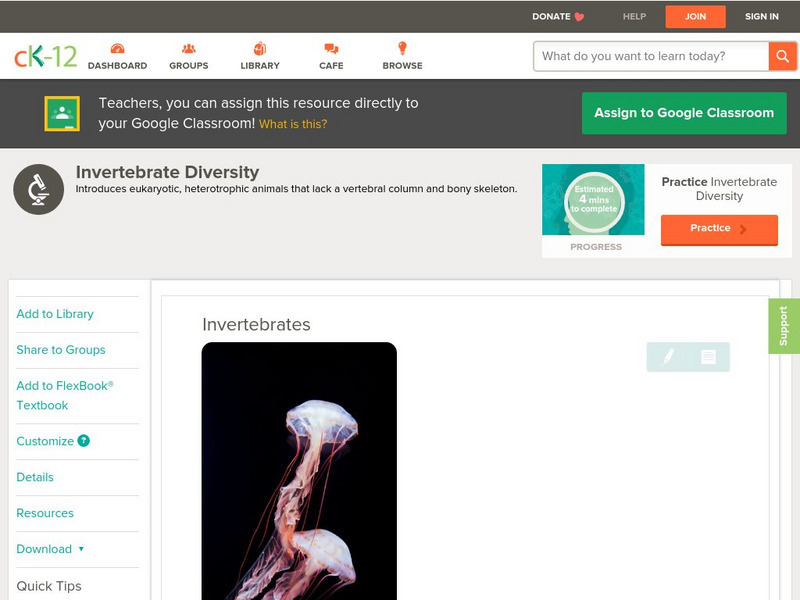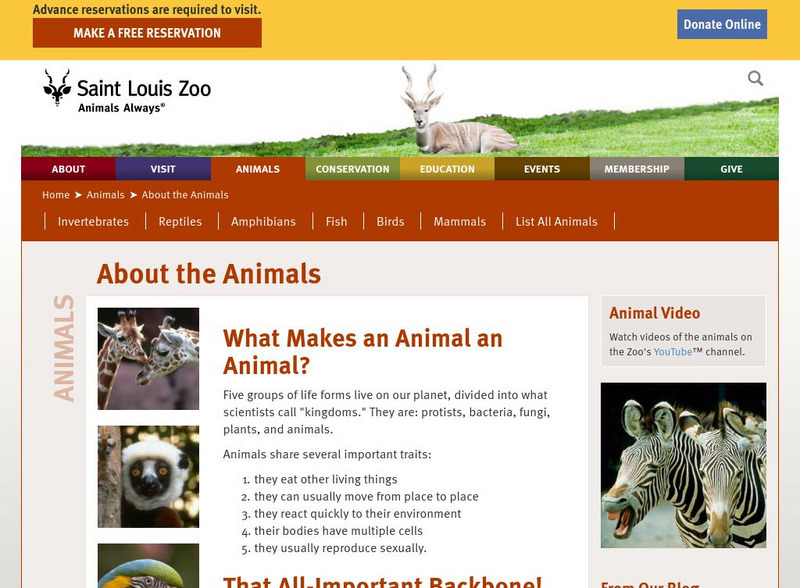Curated OER
Animals Vocabulary List and Definitions
In this animal words worksheet, students match 15 words pertaining to animals to their definitions in another column. These definitions are related to the general animal kingdom.
Curated OER
Ocean Vocabulary
In this vocabulary activity, students match words related to the ocean to their definitions. Worksheet is labeled as a quiz, but may be used as review/practice.
Curated OER
Collecting Fossils
In this fossils worksheet, students will read about the hobby of fossil collecting and the tools needed for collecting fossils. Students will complete 3 short answer questions based on their reading.
Curated OER
Introduction to Paleontology Lab
Students engage in a lab which introduces them to fossils and paleontology. They examine eleven numbered boxes containing fossils which are related to the questions on this lab then answer questions on a lab sheet imbedded in this plan.
Curated OER
Classification of Living Things
In this biology worksheet, learners identify and locate various vocabulary terms relating to the classification of living things. There are 28 biology terms located in the word search.
Curated OER
Tucson Children's Museum Dino Crossword
In this crossword puzzle, students complete a crossword puzzle related to dinosaurs, the era in which dinosaurs lived, and about other animals that lived during that time period.
Curated OER
Oddball Out: Animals
In this problem solving worksheet, learners analyze a row of pictures
of various animals to determine which creature is different from
the others pictured.
Curated OER
The Reptiles
In this reptiles worksheet, students match 9 terms from a word list to the statement that it completes. Then students write 1 short paragraph about how they feel about reptiles.
ArtsNow
Arts Now Learning: Dance With Vertebrates and Invertebrates [Pdf]
In this instructional activity, 5th graders use movement and dance composition to aid in the understanding of vertebrates and invertebrates.
BiologyWise
Biology Wise: Vertebrates and Invertebrates
The characteristics of vertebrates and invertebrates are described here. Includes a list of examples for each group and a chart highlighting their differences.
Alabama Learning Exchange
Alex: Vertebrates or Invertebrates
During this lesson, students navigate the Internet to discover facts about vertebrates and invertebrates. They use the facts they learn to participate in several class activities.
ClassFlow
Class Flow: Vertebrates and Invertebrates
[Free Registration/Login Required] Using this lesson the students will review the 2 groups of animals - vertebrates and invertebrates. They will be actively involved in classifying animals. An Activote assessment is also included.
CK-12 Foundation
Ck 12: Life Science: Invertebrates
[Free Registration/Login may be required to access all resource tools.] Animals are also often identified as being either invertebrates or vertebrates. These are terms based on the skeletons of the animals. Vertebrates have a backbone...
Globio
Glossopedia: Animals
The animal kingdom and its classification are explained and broken down into vertebrates and invertebrates in this resource. "Best-of" the animal kingdom list given - fastest, smallest, largest, strongest and more.
Science Education Resource Center at Carleton College
Serc: Mn Step: Water Retention No Problem With the Key Investigation
Learners go outside to a nearby pond or wet area, and collect vertebrates and invertebrates. These are identified using a classification key. Information is recorded using a digital camera and a science notebook. Students later prepare a...
Saint Louis Zoo
Saint Louis Zoo: About the Animals: What Makes an Animal an Animal?
Short introduction to animals explains the important traits that all animals share and the differences between vertebrates and invertebrates.
ClassFlow
Class Flow: Classifying Invertebrates
[Free Registration/Login Required] This is a lesson on classifying invertebrates based on their observable features. It focuses on the three types of worms: flatworm, roundworm, and segmented worm. The lesson contains 3 videos as well as...
ClassFlow
Class Flow: Animal Classification
[Free Registration/Login Required] Students will classify organisms into groups and relate how they determined the groups with how and why scientists use classification. They will also demonstrate how animals are sorted into groups...
Other
Denver Museum of Nature and Science: Follow a Fossil
Students examine paleontology, the study of ancient life on Earth. Some topics explored are vertebrates, invertebrates, and plants.
Georgia Department of Education
Ga Virtual Learning: Ap Biology: Animals
This unit focuses on the unique structure and function of both invertebrate and vertebrate animals. Students review their understanding of animal diversity, and take a closer look at the various organ systems found in the animal kingdom.
Other
Science4 Us: Animals
In online and offline activities, students broaden their understanding of animals by learning to identify and classify animals into six categories: mammals, birds, fish, amphibians, reptiles, and invertebrates.
Canadian Museum of Nature
Canadian Museum of Nature: Natural History Notebooks
A great reference source for a variety of vertebrate and invertebrate animals. This exhaustive resource also has some prehistoric extinct animals that students can compare to their living counterparts to increase their understanding of...
TED Talks
Ted: Ted Ed: How Do Animals Experience Pain?
How do the animals all around us experience pain? Robyn J. Crook examines pain in both vertebrate and invertebrate animals. [5:06]
PBS
Idaho Ptv: Dialogue for Kids: Zoology
A collection of facts and links on the field of zoology. The facts cover what zoology is, the diversity of vertebrate and invertebrate animals studied in zoology, scientific names for animals, where zoologists work, zoos around the...










![Arts Now Learning: Dance With Vertebrates and Invertebrates [Pdf] Lesson Plan Arts Now Learning: Dance With Vertebrates and Invertebrates [Pdf] Lesson Plan](https://d15y2dacu3jp90.cloudfront.net/images/attachment_defaults/resource/large/FPO-knovation.png)










